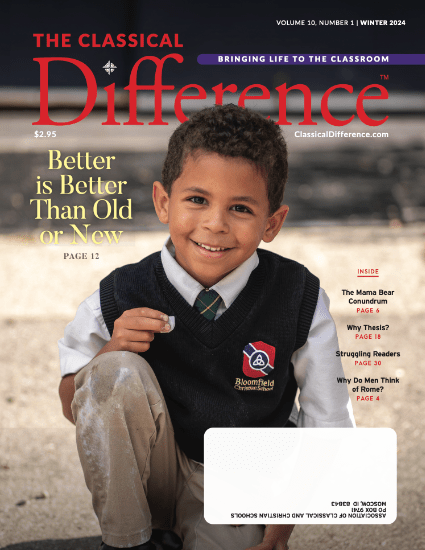ACCS alumni are more involved in church and community.
Preparation + Calling = Mission
When it comes to education, most people focus mainly on college and jobs. Commitment to a bigger purpose might not be top-of-mind when you have toddlers in the house, but when pigtails have been replaced with a college graduation cap, most parents realize that happiness comes in a committed relationship with Jesus Christ. That investment begins during the little years, continues into the wonder years, and solidifies as young adults come of age.
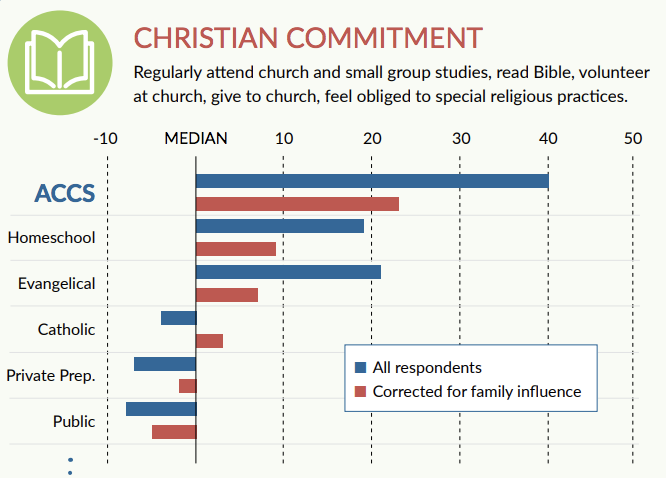
Blue bars are actual data. The red bars reflect the school’s effect, isolated from other family factors.
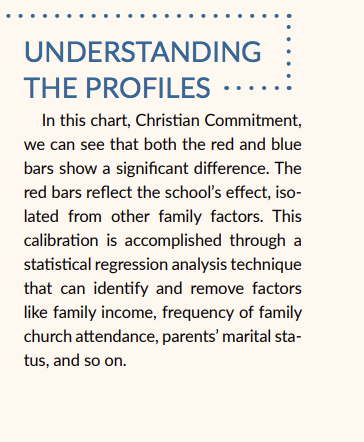
More than twice the number of ACCS alumni exceed the median when we measure Christian commitment as an index. Two groups are above the median along with the ACCS— homeschool and evangelical schools. While they do show strength here as well, the long-term influence of deep Christian worldview integration in classical Christian schools cannot be matched.
ACCS alumni score a 40 on this profile. This translates into 90% reporting above the median for all groups, thus making this profile one of the most pronounced attributes of ACCS alumni. The ACCS red bar (adjusted) is much shorter, which means that much of this effect is due to the family’s influence, which makes sense. But, even then, ACCS schools result in an index score more than twice as high as homeschoolers—the next highest. This means that ACCS schools have a disproportionate impact on Christian Commitment.
When adjusted for family factors, the difference between all other types of schools spans across about 10 points. This means there’s less difference between all other five types of schools than there is between ACCS and the next highest-scoring school type.
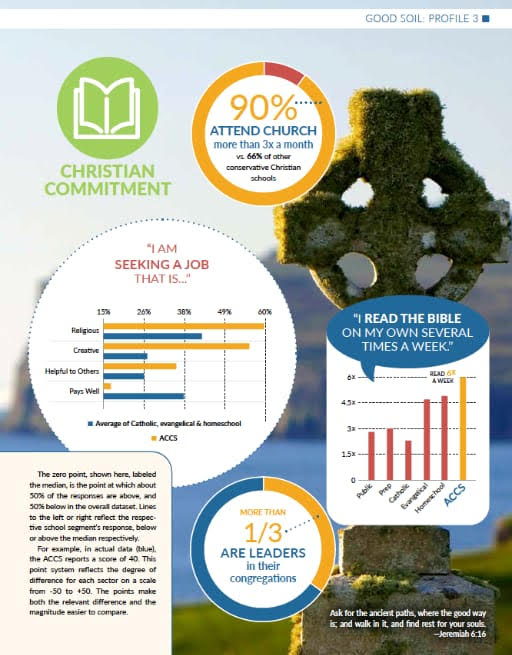
LOOKING DEEPER
Consider this: ACCS alumni are more likely to have doubts about their beliefs than other evangelical school alumni, but they also are much more orthodox and committed in their belief. Classically educated students are  trained to ask tough questions. They are trained to evaluate every truth claim they see. So, we should expect that doubts are there, and that their conviction is strong. Their faith is of the mind, soul, and body. It is not simply spiritual dogma.
trained to ask tough questions. They are trained to evaluate every truth claim they see. So, we should expect that doubts are there, and that their conviction is strong. Their faith is of the mind, soul, and body. It is not simply spiritual dogma.
ACCS schools weave every classroom and activity into an opportunity to cultivate virtue and see the depth of Christ’s teaching.
When it comes to career calling, ACCS alumni once again are quite different. They want to fulfill their religious calling and be creative, while helping others. More than any other group by far, money is less of a factor as they find their calling. More of them are leaders in their congregations than those from other evangelical groups.
Regular church attendance, defined as at least three times a month, reports higher than any other group by more than 30%. Digging a bit deeper, we see that ACCS alumni are more involved in their churches. 83% of ACCS alumni report attending a small group at least once per week. These two factors answer the question so many ask: Do ACCS schools influence whether a student will remain faithful to the church?
When corrected for the school influence alone, about 70% of ACCS alumni read their Bibles on their own at levels higher than the median respondent. Corrected for school effect, ACCS alumni are 2.6 times more likely to pray alone than the median, and 6.7 times more likely to read, regardless of the type of reading.
their Bibles on their own at levels higher than the median respondent. Corrected for school effect, ACCS alumni are 2.6 times more likely to pray alone than the median, and 6.7 times more likely to read, regardless of the type of reading.
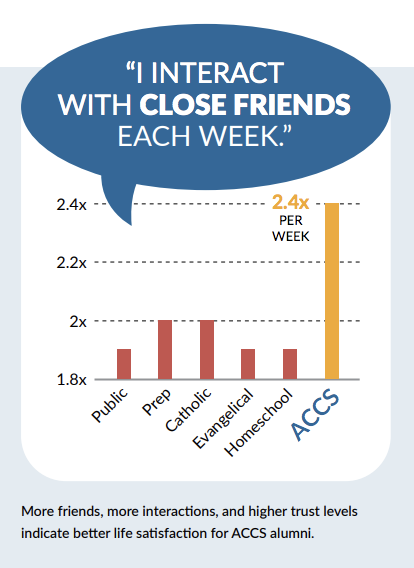 CONCLUSIONS Classical Christian schools may have a Bible class, and occasionally some form of chapel. But these are a small part of their overall approach to bringing Christ to bear on everything. Most Christian schools enjoy a student body primarily from Christian homes. ACCS schools weave every classroom and activity into an opportunity to cultivate virtue and see the depth of Christ’s teaching. Integration between history, literature, philosophy, theology, art, science, and math results in students who are entwined in the inner workings of our world, all of which relate to scriptural truth. Christian commitment often becomes a natural and habitual part of students’ lives. And, it sticks with them, or so the data suggests.
CONCLUSIONS Classical Christian schools may have a Bible class, and occasionally some form of chapel. But these are a small part of their overall approach to bringing Christ to bear on everything. Most Christian schools enjoy a student body primarily from Christian homes. ACCS schools weave every classroom and activity into an opportunity to cultivate virtue and see the depth of Christ’s teaching. Integration between history, literature, philosophy, theology, art, science, and math results in students who are entwined in the inner workings of our world, all of which relate to scriptural truth. Christian commitment often becomes a natural and habitual part of students’ lives. And, it sticks with them, or so the data suggests.



